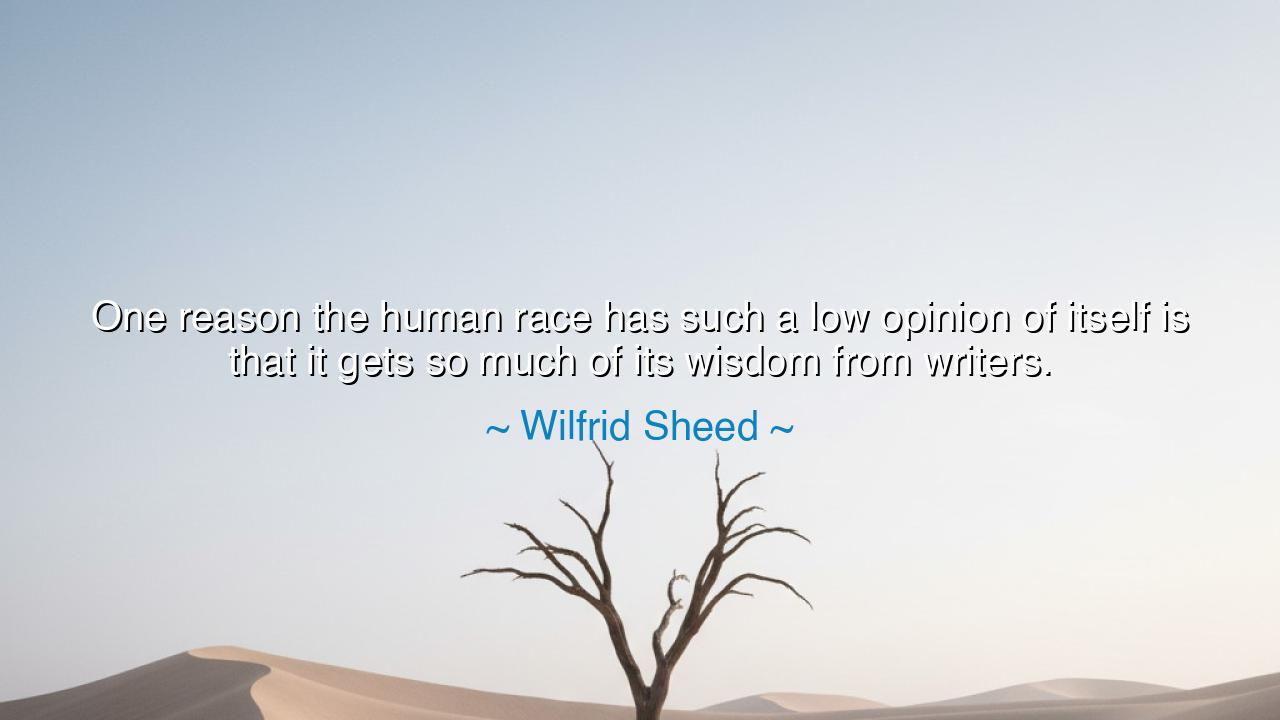
One reason the human race has such a low opinion of itself is
One reason the human race has such a low opinion of itself is that it gets so much of its wisdom from writers.






Hearken, O children of reflection, to the wry observation of Wilfrid Sheed, who discerned a curious ailment of the human spirit: the tendency to form its opinion of itself from the words of others, particularly from writers. He warns that though writers may offer wisdom, their counsel is not always tempered by experience, virtue, or clarity. Often, mankind’s sense of self is shaped by words that magnify flaws, exaggerate follies, or dwell upon human frailty, leading the race to view itself with undue harshness. Here lies a teaching both cautionary and illuminating: not all wisdom received is true wisdom.
The origin of this reflection lies in Sheed’s life as a critic, essayist, and observer of letters, whose keen eye often discerned the paradoxes of human knowledge. He understood that while books, essays, and treatises offer guidance, they also project the biases, anxieties, and limitations of their authors. The written word, powerful though it may be, carries the risk of misrepresenting the human condition, prompting mortals to doubt their own capacity for virtue, courage, and reason.
The meaning of this aphorism is profound: reliance upon secondhand wisdom can distort perception. When humans absorb only the cautionary tales, the criticisms, or the lofty judgments of authors, they may cultivate self-doubt rather than strength. True understanding of life and human nature requires experience, reflection, and discernment, not mere consumption of literary opinions. The written word is a guide, but the mind must weigh it against lived reality.
History illustrates Sheed’s insight with clarity. Consider the Victorian era, when moralists and essayists cataloged human sins, weaknesses, and moral failings, projecting an image of mankind steeped in frailty and vice. Generations, reading these works as scripture of human character, internalized a grim assessment of themselves. Yet beyond the pages, acts of courage, compassion, and brilliance unfolded daily—proof that the human race is far greater than the shadows cast by writers’ pens.
Moreover, Sheed’s teaching extends beyond mere literature. In every age, leaders, philosophers, and chroniclers have shaped public perception, often highlighting faults for instruction or effect. The lesson endures: let not your self-regard be dictated solely by the voices of others, however wise they may seem. Seek understanding through action, observation, and discernment, that your view of humanity may be balanced, nuanced, and truthful.
O generations yet to come, hold this counsel close: wisdom drawn blindly from the written word may cast shadows upon the spirit. Question, reflect, and weigh the voices you encounter. For while writers illuminate, they also mislead, and the measure of the human race—its courage, virtue, and potential—cannot be judged solely by the ink upon a page. Seek the living truth, and let it temper your mind and heart.






HHHi Hi
This statement makes me reflect on the cultural impact of literature and commentary. If human self-criticism is amplified by what writers present, does this mean our education and media consumption could skew perceptions of morality, intelligence, or virtue? I’m curious whether Sheed believes this influence is avoidable, and how individuals might cultivate a more balanced perspective that acknowledges both human limitations and accomplishments without succumbing to cynicism.
NHKhanh Nguyen Hoang
Reading this, I question whether Sheed is critiquing writers’ intentions or the tendency of readers to internalize negativity. Is it that writers consciously highlight human shortcomings, or do audiences simply gravitate toward works that confirm pre-existing doubts about themselves? I’d like to consider whether alternative forms of wisdom—practical experience, observation, or mentorship—might foster a healthier and more empowering view of human nature compared to literary reflection.
THThu Tran thi Hoai
I’m intrigued by the idea that writers influence humanity’s self-opinion. Could it be that literature, philosophy, and essays disproportionately emphasize human error, cruelty, or folly because conflict drives engagement? I wonder whether this focus undermines a nuanced understanding of human potential. How might exposure to more positive or balanced portrayals of humanity change the way we perceive ourselves individually and collectively?
HNHoang Ninh
This quote makes me question the reliability of the wisdom we consume from writers. Does Sheed imply that literature and essays often exaggerate human flaws or focus on pessimistic perspectives, thereby shaping a negative self-image? I’d like to explore whether readers have a responsibility to critically evaluate the messages in writing, or if writers themselves bear the burden of presenting balanced insights. How much does selective focus on human failings distort our collective self-perception?